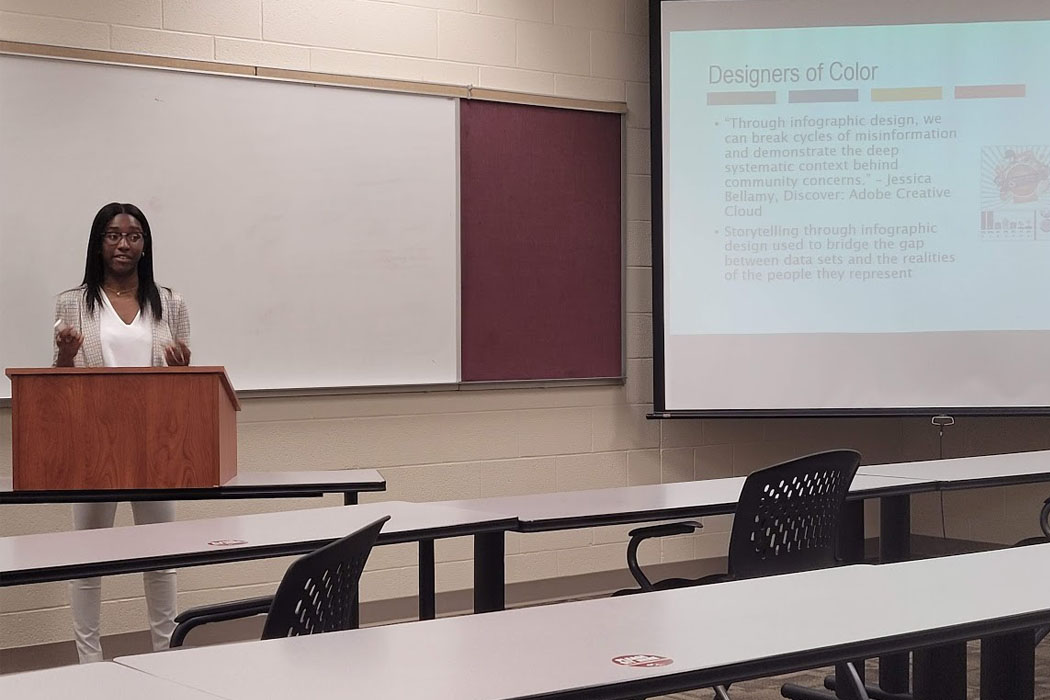Twenty-six seniors in Walsh University’s Honors Program concluded two years of research and preparation with their Theses Defense Presentations from March 22-31. Since 1993, the Walsh Honors Program has existed to offer an interdisciplinary educational experience designed to develop skills essential for lifelong learning. Led by Co-Directors Drs. Laci Fiala and Rachel Constance, this year’s Honors Thesis topics ranged from groundbreaking scientific research to analysis of best practices in healthcare and education. Because of COVID-19 restrictions, this is the first year senior honors students presented their work simultaneously to both a Zoom and small in-person audience.
“This group of scholars had a lot to deal with this year to stay on track, from non-responsive partners, smaller sample sizes, Zooming advisers and readers for feedback— this group also had to defend their proposals via Zoom, which is also a first for the program,” said Dr. Constance. “They also had to adjust to the 8-week schedule, which was partially a pandemic response the University deployed, and that had its own challenges. They adapted, overall, very well and I’d say they demonstrated a ton of resilience through all of it.”
The Capstone project of the Honors Program is an independent research project that investigates an in-depth issue unique to each student’s experience. Modeled after the research of graduate school projects, the Honors Thesis includes a written document and an oral presentation of the project to Walsh faculty and students.
“With the outbreak of the pandemic during the height of our thesis proposals, my proposed wet-lab research project had to be modified into a digital study,” said Biology major Parvanee Karimpour on her group topic of Exploring the Biological Sciences. “Not only were my advisors and mentors in the Owens lab instrumental in guiding me through the process, but I also discovered the incredible potential of digital pathology and computational research.”
This year’s Honors Theses include independent research in fields of Nursing, Biochemistry, Biology, Exercise Science, Pre-PT, Government and Foreign Affairs, Psychology and Sociology, International Relations, Pre-OT, Behavioral Science, Computer Science, Education, Mathematics and for the first time, Graphic Design.
As Walsh’s first Honors student majoring in Graphic Design, Majesti Brown was able to turn her creative eye to explore her Thesis topic of “Design Justice for the Flint Water Crisis: Utilizing a Socially Conscious Infographic to Bring Social Justice to Modern Urban Tragedy.”

“My Honors experience is really important to me because not only did I grow as a student during this time, but it also gave me the opportunity to research and design a creative piece about a topic that I really care about,” said Brown. “What I have learned and created along the way, with the help of my advisor and reader, has proven to me that design students can have a valuable Honors research experience.”
Honors courses are designed to complement other course work. The highly integrated program of challenging academics and co-curricular activities spans a broad range of disciplines, emphasizes interdisciplinary studies and is customized to meet a student’s specific needs and interests.
Walsh senior Christopher Dougherty, majoring in Psychology and Sociology, was able to combine his interest in education equity with a focus on students with disabilities.
“My experience in Honors over the last four years has widened my perspective on many topics while also helping me learn which topics I am truly passionate about,” said Dougherty. “Working on my Thesis has helped me see that disparities in education is an issue that I am passionate about and want to work to resolve in the future.”
Visit the Honors Webpage or Click here to find the full program highlighting each of the nine thematic sessions and their presenters.
“These students really have had to persevere through a tough time,” said Dr. Fiala. “This process starts for them in their first semester as juniors when they explore topic possibilities through an in-depth literature review. They spend the entire next semester, working closely with a faculty adviser, to develop a research focus and methodology. The research and experience has led to many students over the years being accepted into graduate and medical schools at high rates and even excellent job placement.”